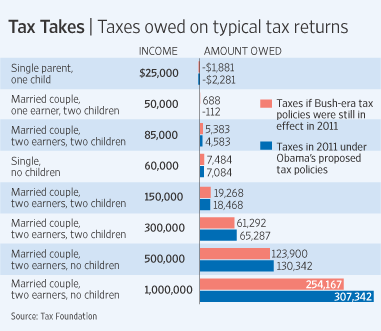| Reply to Thread New Thread |
|
|
#1 |
|
|
Amid the hyperbole on both sides of the argument as to whether the Bush tax cuts should be replaced by a new tax cut structure offer by the Obama administration, the WSJ breaks it down to exactly how much in taxes people in various income windows would pay in either scenario.
WSJ: http://online.wsj.com/article/SB1000...592147682.html 
|
|
|
|
|
#2 |
|
|
|
|
|
|
|
#3 |
|
|
2008 Census data shows $52k nationally. Proposed tax increases would affect about 2% of all households and less than 2% of households claiming their income from business ventures (that is, over 98% of S Corp business or sole proprietorship households would be unaffected or would see tax benefits for their personal filings).
Bloomberg has some interesting analysis of how the arguments for the respective Democratic proposal and Republican proposal are likely to play out in the populist arena heading into the election season. http://www.bloomberg.com/news/2010-0...bert-hunt.html Republicans are in the position of championing a provision that benefits only the top 2 percent to 3 percent of U.S. income earners and adds to the already huge deficit, which the Obama administration forecasts will be $1.47 trillion this year and $1.42 trillion next year. The more articulate Republican advocates such as Ryan argue that the top tax brackets chiefly affect small businesses. Actually, fewer than 2 percent of small businesses fall into these brackets, according to the Tax Policy Center in Washington. And much of those are business income, partnerships and royalties from billionaires, athletes, lawyers and entertainers. There are few mom-and-pop corner stores or job- creating little ventures. The case that these tax cuts are central to economic growth also falls apart, according to expert analyses. The Congressional Budget Office examined 11 different ways to stimulate the economy, and found extending the high-end Bush tax cuts provides the least bang for the buck. Channeling funds to states to avoid service cuts and higher taxes would generate three times the economic activity, the CBO reported. Goldman Sachs Group Inc. similarly estimates state and local assistance would boost economic growth by about twice as much as extending the tax cuts for wealthier Americans. |
|
|
| Reply to Thread New Thread |
«
Previous Thread
|
Next Thread
»
| Currently Active Users Viewing This Thread: 1 (0 members and 1 guests) | |
|
|





 Linear Mode
Linear Mode


